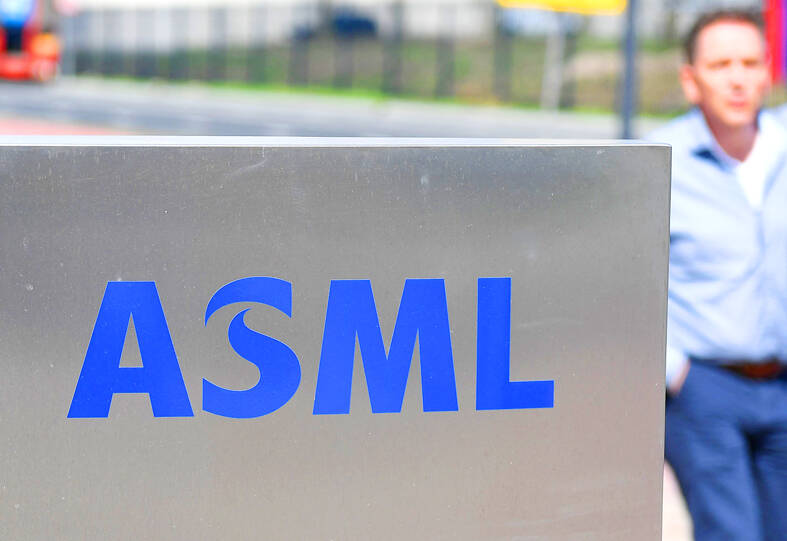ASML Holding NV reported orders for the first quarter that were almost a billion euros less than expected and warned that it does not know how to quantify the impact from recent tariff announcements, which are threatening to upend the semiconductor industry.
The Dutch company, which counts Taiwan Semiconductor Manufacturing Co (台積電) and Intel Corp among its biggest customers, reported bookings of 3.94 billion euros (US$4.48 billion), compared with an average estimate of 4.82 billion euros by analysts surveyed by Bloomberg.
Its shares yesterday sank more than 7 percent in Amsterdam.

Photo: AFP
ASML is the sole producer of cutting-edge lithography machines used by semiconductor companies to make advanced chips for products including Apple Inc’s smartphones and Nvidia Corp’s artificial intelligence (AI) accelerators. Concern over a potential slowdown in AI demand has intensified after disappointing outlooks from some chipmakers and analyst warnings, compounded by looming US tariffs.
“The recent tariff announcements have increased uncertainty in the macro environment and the situation will remain dynamic for a while,” ASML chief executive officer Christophe Fouquet said in a statement yesterday.
ASML outlined ways US tariffs could affect its business, including additional charges on shipments of new systems, tools and parts imported into the country.
Another possible risk is other countries “imposing tariffs on things that are being shipped from the United States into these countries,” ASML chief financial officer Roger Dassen said in a video accompanying the results.
The firm’s “conversations so far” with customers support its expectation that this year and next year would be growth years, driven by AI investments, Fouquet said.
The company’s extreme ultraviolet lithography machines accounted for 1.2 billion euros of net bookings in the quarter.
China accounted for 27 percent of ASML’s net system sales, making it the company’s second-biggest market during the quarter. While that is the same contribution from the preceding three months, it is a drop from the average of 41 percent last year.
ASML forecast that if AI demand continues to be strong and its customers are capable of adding capacity, it had the opportunity to meet the upper range of its total net sales guidance of 30 billion to 35 billion euros for this year.
However, uncertainty with some of its customers could take it to the lower end of the range, it said.
The first quarter orders “disappointed” and the tariff uncertainty is clearly “clouding” the outlook, Citigroup Inc analyst Andrew Gardiner wrote in a note, but pointed to ASML’s reiterated full-year forecast and expectations of further growth next year.
Barclays PLC analyst Simon Coles said that ASML would need 3 billion to 5 billion euros of orders each quarter for the next three to five quarters to hit consensus expectations.
“This seems manageable, but our worry is two major customers are unlikely to be ordering significantly any time soon,” he said.

Intel Corp chief executive officer Lip-Bu Tan (陳立武) is expected to meet with Taiwanese suppliers next month in conjunction with the opening of the Computex Taipei trade show, supply chain sources said on Monday. The visit, the first for Tan to Taiwan since assuming his new post last month, would be aimed at enhancing Intel’s ties with suppliers in Taiwan as he attempts to help turn around the struggling US chipmaker, the sources said. Tan is to hold a banquet to celebrate Intel’s 40-year presence in Taiwan before Computex opens on May 20 and invite dozens of Taiwanese suppliers to exchange views

Application-specific integrated circuit designer Faraday Technology Corp (智原) yesterday said that although revenue this quarter would decline 30 percent from last quarter, it retained its full-year forecast of revenue growth of 100 percent. The company attributed the quarterly drop to a slowdown in customers’ production of chips using Faraday’s advanced packaging technology. The company is still confident about its revenue growth this year, given its strong “design-win” — or the projects it won to help customers design their chips, Faraday president Steve Wang (王國雍) told an online earnings conference. “The design-win this year is better than we expected. We believe we will win

Quanta Computer Inc (廣達) chairman Barry Lam (林百里) is expected to share his views about the artificial intelligence (AI) industry’s prospects during his speech at the company’s 37th anniversary ceremony, as AI servers have become a new growth engine for the equipment manufacturing service provider. Lam’s speech is much anticipated, as Quanta has risen as one of the world’s major AI server suppliers. The company reported a 30 percent year-on-year growth in consolidated revenue to NT$1.41 trillion (US$43.35 billion) last year, thanks to fast-growing demand for servers, especially those with AI capabilities. The company told investors in November last year that

Power supply and electronic components maker Delta Electronics Inc (台達電) yesterday said it plans to ship its new 1 megawatt charging systems for electric trucks and buses in the first half of next year at the earliest. The new charging piles, which deliver up to 1 megawatt of charging power, are designed for heavy-duty electric vehicles, and support a maximum current of 1,500 amperes and output of 1,250 volts, Delta said in a news release. “If everything goes smoothly, we could begin shipping those new charging systems as early as in the first half of next year,” a company official said. The new